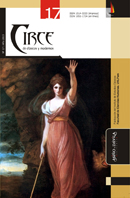Leon Battista Alberti’s Momus and Intercenales: simulation, absurdity and laughter
Keywords:
Alberti, reason, absurd, laughter, simulationAbstract
Far from the interpretation of Leon Battista Alberti as a prototype of the “universal man”, GARIN has analyzed the contradictory nature of Alberti’s thought. In fact, in the exten-sive and versatile work of the Genoese humanist two opposite visions of man and the world coexist: one believes in the power of reason, the other acknowledges the absurdity of life. It is in Momus and the Intercenales that this “somber Alberti” is present. In these texts the appeal to a simulated life is addressed through a form of laughter that demystifies the human ideal of the early Italian Renaissance.
Downloads
Downloads
Published
Issue
Section
License
Los autores que tengan publicaciones con esta revista, aceptan los términos siguientes referidos a los derechos de autor/a:
1. Los autores/as conservarán sus derechos de autor y garantizarán a la revista el derecho de primera publicación de su obra, el cuál estará simultáneamente sujeto a la Licencia de reconocimiento de Licencia Creative Commons Atribución-NoComercial-CompartirIgual 4.0 Internacional (http://creativecommons.org/licenses/by-nc-sa/4.0/). que permite a terceros compartir la obra siempre que se indique su autor y su primera publicación esta revista. El autor es el titular del copyright.
2. Los autores/as podrán adoptar otros acuerdos de licencia no exclusiva de distribución de la versión de la obra publicada (postprint) siempre que se indique la publicación inicial en esta revista. La cesión de derechos no exclusivos implica también la autorización por parte de los autores para que el trabajo sea depositado en el repositorio institucional y difundido a través de las bases de datos que el editor considere adecuadas para su indización, con miras a incrementar la visibilidad de la publicación y de sus autores.
3. Se permite y recomienda a los autores/as difundir su obra a través de Internet antes y durante el proceso de envío, lo cual puede producir intercambios interesantes y aumentar las citas de la obra publicada.







.jpg)









2.png)



